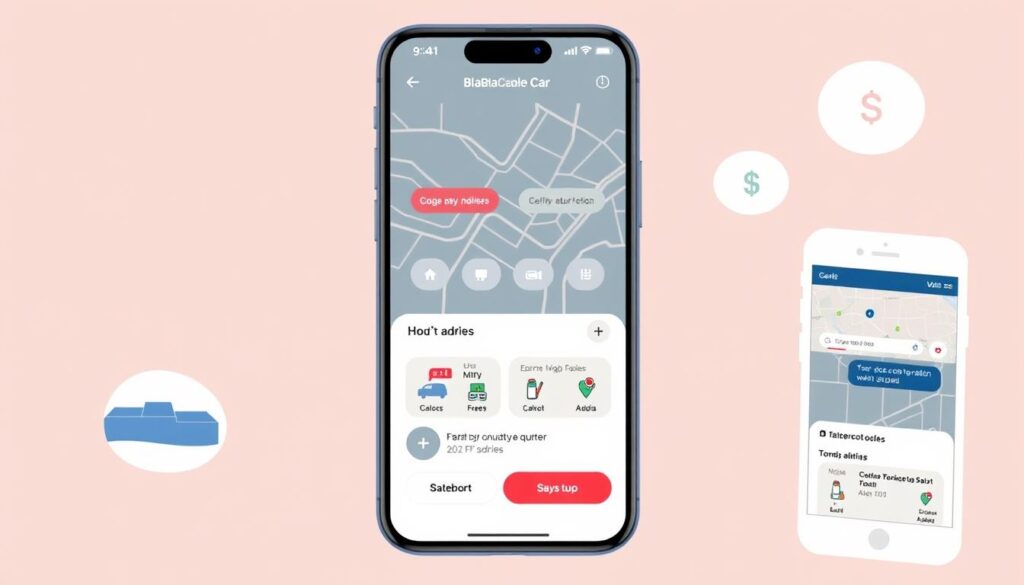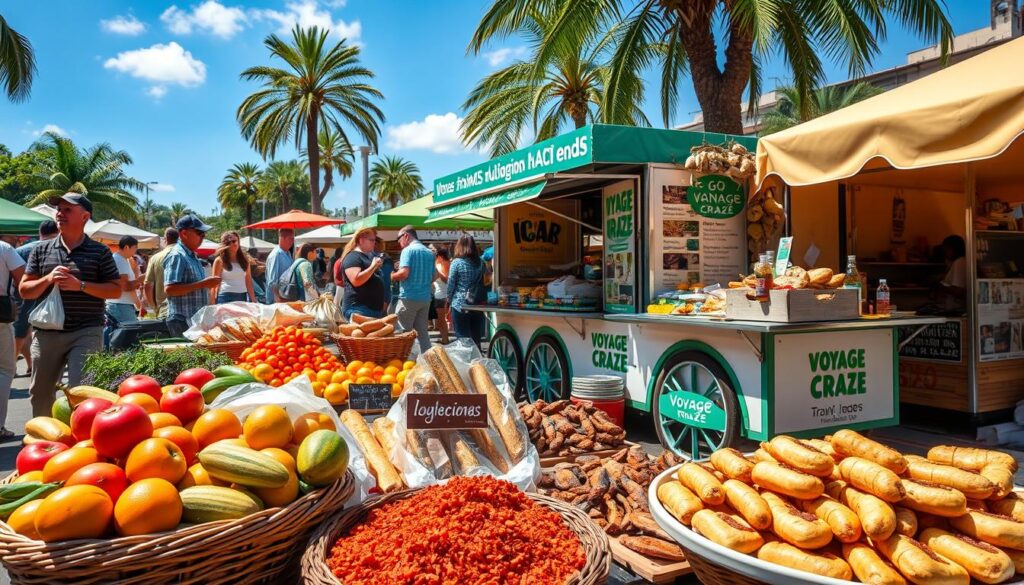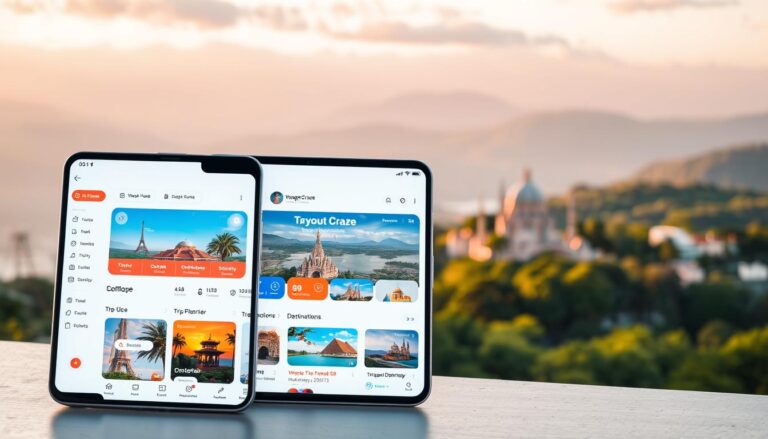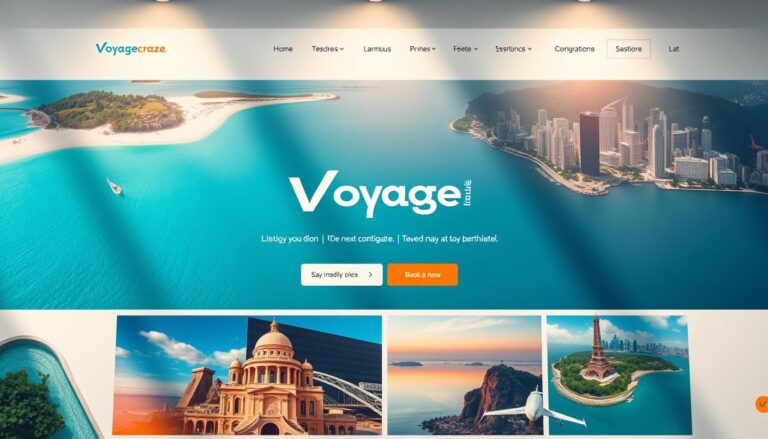Traveling often feels like a luxury reserved for the wealthy. But what if we told you that incredible adventures are achievable, even on an average budget?
By embracing smart planning and a focus on local experiences, you can still explore new places without straining your wallet. Discovering new destinations doesn’t have to break the bank; it’s about making smart choices that allow you to enjoy meaningful experiences without financial strain.
Maximizing your vacation funds isn’t just about spending less—it’s about spending wisely on what truly matters to you. With the right mindset and a few practical strategies, you can make the most of your trip and create lasting memories.
Key Takeaways
- Learn how to make smart choices while traveling to save money.
- Understand that affordable travel is a skill that can be developed through research and planning.
- Discover how to enjoy local experiences without straining your budget.
- Explore new destinations and create lasting memories on your next vacation.
- Find out how to spend wisely on what truly matters to you with our comprehensive guide.
The Mindset of Budget Travel
Adopting the right mindset is crucial for successful budget travel. Changing your mindset might not be a traditional budget tip, but it’s essential nonetheless. Constantly reminding yourself that travel is possible while taking concrete steps to make it a reality is vital. Action begets action — even if it’s just baby steps. Starting with a “yes, I can” mindset can significantly impact your ability to travel affordably.
Understanding that budget travel begins with the right mindset is key. It’s about believing that meaningful travel experiences are accessible regardless of your financial situation. This mindset allows travelers to focus on what truly matters during their trip.
Why Travel Doesn’t Have to Break the Bank
Many travelers believe that exploring new destinations requires a significant amount of money. However, this isn’t necessarily true. By distinguishing between travel luxuries and necessities, travelers can focus their spending on what truly enhances their experience. Shifting from a scarcity mindset to a possibility mindset opens up creative solutions for affordable travel. Budget travel isn’t about deprivation; it’s about prioritization — spending on experiences that matter most to you.
Reframing “cheap travel” as “value travel” can also make a significant difference. It’s about maximizing experiences rather than minimizing costs. By doing so, travelers can enjoy their trips without feeling like they’re missing out.
Setting Realistic Expectations
Setting realistic expectations about costs and experiences is crucial for avoiding disappointment and financial stress during your trip. Travelers should understand that budget travel requires some planning and research. By doing so, they can make informed decisions about their expenses and ensure that their trip remains within budget.
By adopting a budget travel mindset, travelers can explore the world without financial strain. Small daily actions can build momentum toward making travel dreams a reality, regardless of the current financial situation. Discovering how other travelers have successfully adopted budget travel mindsets can also provide valuable insights and inspiration.
Planning Your Trip Strategically
The key to an affordable and memorable travel experience lies in meticulous planning and research. By giving yourself ample time, you can research and compare destinations, flights, accommodations, and activities, ultimately making informed decisions that save you money and enhance your travel experience.
Start Planning Early
Planning your trip early is crucial for budget travel. It gives you the time to track and compare prices of flights, accommodations, and activities. Early planning also allows you to take advantage of early bird discounts offered by tourism sites like Booking.com, Airbnb, and Turo.
Choose Budget-Friendly Destinations
Choosing a budget-friendly destination is the first rule of traveling on a budget. Regions like Southeast Asia, South America, Central America, and Eastern Europe offer rich cultural experiences without the high costs. A trip to these regions can be just as fulfilling as visiting popular but expensive destinations like Disneyland or Hawaii.
Create a Detailed Travel Budget
Creating a comprehensive travel budget is essential. It helps you account for all expenses, from transportation to souvenirs, ensuring you stay within your means. By prioritizing your spending based on what matters most to you, you can make the most of your trip.
Finding Affordable Flights
To maximize your travel budget, it’s essential to know how to find affordable airfare. The key to securing cheap flights lies in a combination of flexibility, the right tools, and strategic planning.
Best Flight Search Tools and Strategies
Utilizing the right flight search tools can significantly simplify the process of finding affordable flights. Tools like Google Flights, Skyscanner, and Kayak allow travelers to track airfare prices, set price alerts, and compare prices across different airlines and airports.
Being flexible with your travel dates can also lead to substantial savings. Flying on a weekday instead of a weekend can often result in cheaper fares. Using the calendar or date grid feature on flight search platforms can help identify the cheapest days to fly.
Optimal Booking Times
Timing is everything when it comes to booking flights. Research suggests that booking at the right time can make a significant difference in the cost of your ticket. Generally, it’s advisable to book domestic flights around 2-3 months in advance and international flights about 6-8 months ahead of time.
Leveraging Airline Miles and Points
Airline miles and points programs can be a valuable resource for travelers looking to save on flights. By understanding how these programs work and maximizing their benefits, travelers can secure free or discounted flights. Credit card rewards, frequent flyer programs, and loyalty schemes can accumulate points that can be redeemed for air travel.
To get the most out of airline miles and points, it’s crucial to choose the right credit card, monitor your points balance, and look out for opportunities to earn bonus points. Redeeming points strategically, such as during off-peak travel periods, can also enhance their value.
Budget-Friendly Transportation Options
Navigating unfamiliar cities and countries can be done affordably with the right transportation choices. Travelers can save a significant amount of money by opting for budget-friendly transportation methods.
Public Transportation Tips
Using public transportation is one of the most cost-effective ways to get around a city. Systems like buses, subways, and trams are not only affordable but also provide a local experience. Google Maps is an invaluable tool for planning your route and understanding the transportation network in unfamiliar cities.
Many cities offer multi-day tickets or travel passes that can significantly reduce your costs. Researching these options before your trip can help you save even more money.
Ridesharing and Alternative Transport
For intercity travel, services like FlixBus and BlaBlaCar offer affordable and reliable options. FlixBus operates in over 40 countries, providing a cheap alternative to trains and flights. BlaBlaCar, a ride-sharing app available in 21 countries, allows you to catch a ride with local drivers who have extra space in their cars.

Ridesharing services can be a cost-effective way to travel long distances while also reducing your environmental footprint.
When to Rent a Car vs. Using Public Transit
Deciding between renting a car and using public transit depends on several factors, including the duration of your stay, the areas you plan to visit, and your budget. For short trips or when exploring city centers, public transportation and walking are often the most convenient and affordable options.
However, for longer trips or when visiting rural areas, renting a car might be more practical. It’s essential to weigh the costs and benefits of each service to make an informed decision.
Affordable Accommodation Strategies
The key to a successful budget trip lies in selecting the right accommodation, which can greatly impact overall travel costs. Travelers have a wide range of options beyond traditional hotels, from hostels and guesthouses to budget hotel chains.
Hostels, Guesthouses, and Budget Hotels
Hostels are known for their low-cost, dormitory-style accommodations, attracting the backpacker crowd and solo travelers who enjoy the social atmosphere. Many hostels now offer in-room lockers and privacy curtains, enhancing the overall experience. Some hostels also provide private rooms with ensuite bathrooms, which tend to book up quickly. To find the best hostels, travelers can use platforms like HostelWorld or Hostelz to compare prices, read reviews, and view photos before booking.
Guesthouses and budget hotels offer another affordable alternative, often providing a more personalized experience. These establishments can range from simple, family-run operations to larger, budget hotel chains. Travelers should consider factors like location, amenities, and access to public transportation when choosing their accommodation.
Vacation Rentals and Home Sharing
Vacation rentals and home sharing platforms have become increasingly popular among travelers seeking affordable accommodations with additional amenities. Services like Airbnb allow travelers to rent apartments, houses, or even just a room in a local’s home, often at a lower cost than booking a hotel room. These rentals frequently include kitchen facilities, enabling travelers to prepare their own meals and save on food expenses.
When using vacation rental platforms, it’s essential to carefully review the listing, check the location, and understand the fee structure to avoid any unexpected costs. Reading reviews from previous guests can also provide valuable insights into the quality of the accommodation and the host.
House Sitting and Alternative Lodging
For the more adventurous travelers, house sitting and alternative lodging options can offer significant savings. House sitting involves taking care of someone’s home while they are away, often in exchange for free accommodation. This option not only reduces accommodation costs but also provides a unique opportunity to experience local life.
Other alternative lodging options include monastery stays, farm stays, and houseboats. These choices can offer a distinctive travel experience and are often more budget-friendly than traditional accommodations. Plenty of resources are available online to help travelers find these unconventional lodging options.
By exploring these affordable accommodation strategies, travelers can significantly reduce their travel expenses, allowing them to allocate more resources to enjoying their destination. Whether opting for a hostel, vacation rental, or alternative lodging, the key is to plan ahead, research thoroughly, and choose an option that best fits your travel style and needs.
Essential Budget Travel Tips for Food and Dining
The way you eat while traveling can greatly impact your overall trip budget. Managing food expenses effectively is crucial for staying within your means and enjoying a fulfilling travel experience.
One of the most effective ways to save money on food while traveling is to adopt the habits of locals. This not only helps in reducing costs but also enhances your cultural experience and understanding of your destination.
Eating Like a Local
Eating like a local involves more than just trying new foods; it’s about immersing yourself in the local culture. To do this, you can start by avoiding touristy restaurants and opting for eateries that are frequented by locals. These places often serve authentic and delicious meals at a fraction of the cost.
Street food is another excellent way to experience local cuisine. Not only is it typically cheaper, but it’s also fresher and more flavorful. Practically any foreign country you visit will have a local food market at least a few days per week. The food there is often cheaper and fresher than in supermarkets. Plus, you’ll experience the sights, sounds, and smells of a country.

Self-Catering and Grocery Shopping
Buying food at the supermarket or cooking meals will almost always be cheaper than eating out. Most hostels will have a kitchen with a fridge where you can store food, and a stove and/or oven for cooking. Airbnbs or vacation homes will too, just make sure to check the amenities carefully so you’re not disappointed.
Navigating foreign grocery stores can be a fun adventure. You can discover new products and flavors while saving money. To make the most of self-catering, it’s essential to plan your meals and make a grocery list before heading out to shop.
Finding Affordable Restaurants
While self-catering is a great way to save money, there are times when you might want to eat out. To find affordable restaurants, look for places that are popular with locals. You can ask your hostel or host for recommendations, or use apps that can help you find affordable dining options in unfamiliar locations.
Understanding how to balance eating out with self-catering can help maximize both your budget and your culinary experiences. By being mindful of your food expenses and making informed choices, you can enjoy your trip without breaking the bank.
Free and Low-Cost Activities
Discovering new destinations can be done on a budget by leveraging free walking tours, visiting local markets, and enjoying public spaces. Many cities offer a range of activities that are either free or low-cost, allowing travelers to experience the local culture without overspending.
Free Walking Tours and City Attractions
Free walking tours are an excellent way to explore a city while learning about its history and culture. These tours, often led by knowledgeable local guides, are available in over 120 countries and are typically free, although a tip is appreciated at the end. For example, travelers can join a free walking tour to discover hidden gems and iconic landmarks in cities like Paris, Rome, or Barcelona.
To find the best free walking tours, travelers can search online or check websites like Meetup.com, which often feature local guides offering free tours. This not only provides an authentic local experience but also allows travelers to connect with like-minded individuals.
Museums, Parks, and Cultural Sites
Many museums, galleries, and cultural sites offer free or discounted admission on certain days or at specific times. For instance, Madrid’s Museo Reina Sofía offers free admission on Monday and Wednesday through Saturday from 7-9 p.m. and on Sundays from 12:30-2:30 p.m., allowing visitors to view Picasso’s Guernica without spending a dime.
Additionally, churches, castles, and ruins are often free or low-cost to visit, providing a glimpse into the city’s historical and cultural heritage. Travelers can plan their itinerary around these special offers to enjoy a rich cultural experience without breaking the bank.
Local Events and Festivals
Local events and festivals are another great way to experience a city’s culture without overspending. Platforms like Meetup.com and Couchsurfing can help travelers discover unique events and connect with locals. By participating in these events, travelers can gain a deeper understanding of the local way of life and create lasting memories.
Moreover, public spaces like parks, plazas, and markets offer authentic cultural immersion without any entrance fees. Travelers can soak up the local atmosphere, try street food, and interact with locals, making for a well-rounded travel experience.
Maximizing Travel Rewards and Loyalty Programs
Maximizing travel rewards and loyalty programs is a game-changer for budget-conscious travelers. By strategically using credit cards, hotel loyalty programs, and booking site rewards, travelers can accumulate points and miles that can be redeemed for flights, hotel stays, and other travel perks.
Credit Card Points and Miles
Credit card points and miles are a crucial component of travel rewards. Travelers can earn hundreds of thousands of miles without additional spending by using the right credit cards and techniques. For instance, certain travel rewards credit cards offer sign-up bonuses, everyday spending rewards, and special promotions that can significantly boost one’s points balance.
To maximize credit card rewards, it’s essential to choose cards that align with your spending habits and travel goals. Researching and comparing different travel credit cards can help you find the best fit. Some cards offer flexible redemption options, while others provide more rigid structures.
Hotel and Booking Site Loyalty Programs
Hotel and booking site loyalty programs offer another avenue for accumulating rewards. Programs like Booking.com’s Genius and Expedia One Key provide tiered statuses that unlock benefits such as free breakfast, free cancellation, and discounts on bookings. By understanding how these programs work and achieving higher status levels, travelers can enjoy significant savings and perks.
Combining Rewards for Maximum Value
One of the most effective strategies for maximizing travel rewards is combining different loyalty programs. By transferring points between programs, using credit card points to book hotel stays, or leveraging airline miles for flights, travelers can create a robust rewards portfolio. This approach requires some planning and research but can lead to substantial rewards.
To get the most out of travel rewards and loyalty programs, it’s crucial to stay organized and informed. Tracking multiple loyalty programs, understanding the value of different types of points and miles, and knowing how to redeem them effectively are key to maximizing your travel budget.
Timing Your Travel for Maximum Savings
The key to affordable travel lies in understanding the best times to visit your desired destination. Travelers who can flex their schedules to avoid peak seasons often find significant savings on flights, accommodations, and activities.
Off-Season and Shoulder Season Benefits
Traveling during the off-season or shoulder season can dramatically reduce costs. In the Northern Hemisphere, the off-season typically falls between November and March, excluding major holidays. For the Southern Hemisphere, it’s usually from June to August. Travelers can expect lower prices on flights and accommodations during these periods, making it an ideal time for budget-conscious explorers.
However, it’s essential to research local events and festivals that might affect prices and availability, even during off-peak periods. For instance, a destination might be bustling during a local festival, even if it’s technically off-season. Utilizing tourism sites, travel blogs, and forums can provide valuable insights into the best times to visit.
- Lower prices for flights and accommodations
- Fewer tourists, leading to a more authentic experience
- Potential for last-minute deals and flash sales
Avoiding Peak Travel Periods
Peak travel periods, such as school holidays, major festivals, and high seasons, come with inflated prices. Planning around these times is crucial for saving money. For example, avoiding summer weekends in popular destinations or steering clear of major holidays like Christmas and New Year’s can lead to more affordable travel options.
Understanding the local calendar and being aware of events that attract large crowds can help travelers plan more cost-effectively. Additionally, considering the impact of business travel patterns on leisure travel pricing can provide further savings opportunities.
| Travel Period | Characteristics | Price Impact |
|---|---|---|
| Off-Season | Fewer tourists, lower demand | Lower prices |
| Shoulder Season | Moderate demand, good weather | Moderate prices |
| Peak Season | High demand, many tourists | Higher prices |
Money-Saving Travel Hacks
Maximizing your travel budget is achievable through a combination of planning, flexibility, and insider knowledge. By employing a few savvy strategies, travelers can significantly cut costs and enhance their overall travel experience.
Packing Smart to Avoid Extra Fees
Packing light is a travel hack that saves you money on checked baggage fees and time at the airport. It also eliminates the chance of your luggage getting lost. Experienced travelers swear by using packing cubes to compress and organize their belongings. Packing neutrals that can be mixed and matched to build multiple outfits is another smart strategy. Additionally, doing laundry while you’re there, either by hand washing in your accommodation or using a laundry service, can significantly reduce the amount of luggage you need to carry.
Managing Currency Exchange
When traveling internationally, managing currency exchange is crucial to avoid unnecessary fees. Many major U.S. banks and credit unions offer foreign currency to members at a fair exchange rate and without additional fees. Depending on your bank, you may be able to order currency online or by phone, avoiding the need to wait in line at the branch. Using the right credit cards abroad can also save you money on foreign transaction fees and currency conversion.
Travel Insurance Considerations
Understanding your travel insurance options is vital to ensure you’re adequately protected without overpaying for coverage you don’t need. When evaluating travel insurance, consider the types of coverage offered, such as trip cancellations, medical emergencies, and luggage loss. Look for policies that cater to your specific travel needs and compare providers to find the best value.
Conclusion: Making the Most of Your Travel Budget
Budget travel is not just about cutting costs; it’s about making the most of your money. By combining multiple strategies and being open to new experiences, you can enjoy a fulfilling trip without breaking the bank.
Successful budget travel involves understanding that it’s an ongoing process. Each vacation provides opportunities to refine your approach and develop skills that translate to better financial management at home. With the right mindset, you can discover that the most memorable experiences come from authentic connections and unexpected discoveries.
By embracing this approach, you’ll find that there’s plenty of ways to save money on expenses and still have a great travel experience. So, start planning your next travel adventure today, and find the best way to make your budget go further.







